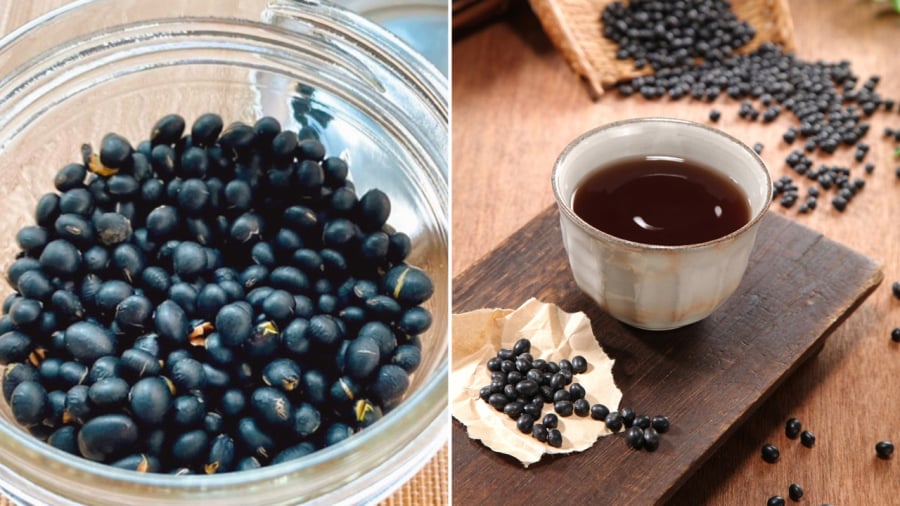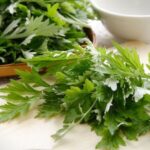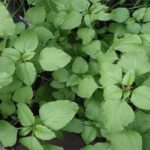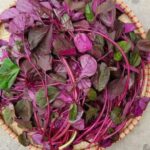Black beans are a highly nutritious grain, commonly used in meals and as an ingredient in traditional Chinese medicine. Many people consume black bean water as a cooling drink, especially during the summer months.
Nutritional Value of Black Beans
A serving of 86 grams of cooked black beans provides approximately 114 kilocalories, 20.39 grams of carbohydrates, 7.5 grams of fiber, 0.46 grams of fat, and 7.62 grams of protein. Black beans are also a good source of calcium, magnesium, iron, phosphorus, potassium, sodium, zinc, thiamin, niacin, folate, and vitamin K.
Plant nutrients in black beans such as saponins, anthocyanins, kaempferol, and quercetin possess antioxidant properties.
Black beans contain two compounds, isoflavone and anthocyanin, which can help regulate fat metabolism.
Black beans contain a complex form of carbohydrate that provides slow-releasing energy. This type of carbohydrate is slowly digested by the body, helping to prevent sudden spikes in blood sugar levels.
Benefits of Drinking Roasted Black Bean Water
- Skin Brightening and Acne Reduction
Black beans are a rich source of 10 essential amino acids, including tryptophan, lysine, methionine, and phenylalanine. These amino acids play a crucial role in hydrating the skin, maintaining and stimulating collagen production, and promoting skin cell regeneration.
In traditional Chinese medicine, black beans are believed to possess cooling and detoxifying properties. Consuming roasted black bean water in moderation can help improve skin health, leading to a brighter complexion and reduced acne.
- Weight Loss Support
Drinking water made from roasted black beans is a popular weight loss aid. Black beans are high in fiber and contain amino acids that promote fat metabolism and prevent the accumulation of excess body fat.
For effective weight loss, consider drinking roasted black bean water about 30 minutes before meals. This practice can help induce a feeling of fullness and reduce overeating.

- Improved Digestion
Black beans are a good source of fiber, which can promote healthy digestion. Individuals experiencing digestive issues such as indigestion, bloating, and constipation may find relief by consuming a moderate amount of black bean water.
Additionally, the amino acids and minerals present in black beans support the growth of beneficial bacteria in the gut, further enhancing digestive function.
- Lower Cholesterol and Improved Blood Sugar Control
The high fiber content of black beans plays a role in reducing blood cholesterol levels and slowing the absorption of glucose, preventing sudden spikes in blood sugar. The vitamins and enzymes in this beverage also improve blood circulation and help prevent vascular complications in individuals with diabetes.
How Much Roasted Black Bean Water Should You Drink?
According to VnExpress, Dr. Huynh Tan Vu, from the Department of Traditional Medicine at Ho Chi Minh City Medicine and Pharmacy University, recommends that black bean water should not be consumed as a daily replacement for water. Excessive consumption may interfere with the absorption of essential nutrients.
Black beans contain phytates, which can hinder the absorption of minerals like copper, zinc, iron, and phosphorus. Reduced absorption of these minerals may lead to issues such as osteoporosis and anemia.
It is suggested to drink black bean water 2-3 times a week, with a serving size of about 100-250ml each time.
When consuming black bean water, it is advisable to minimize the addition of sugar, especially for individuals with diabetes or high blood sugar levels.
People with kidney problems should also refrain from drinking excessive amounts of black bean water due to its diuretic effect.
How to Make Roasted Black Bean Water
Select black beans that are green inside, with uniform-sized seeds. Rinse the beans, removing any damaged or shriveled beans. Spread the beans on a thin mat and let them air dry.
Place a pan on the stove and add the black beans, roasting them over low heat. Continue roasting until the beans are evenly cooked and fragrant. Alternatively, you can use an oven or an air fryer to cook the beans. When the beans start to crack open, gently rub them between your fingers; if the shells come off easily and the insides turn yellow with a pleasant aroma, they are ready.
Allow the roasted beans to cool completely, then store them in a jar with a tight-fitting lid. When ready to prepare the drink, take a handful of roasted beans and add them to a pot with water. Bring the water to a boil and let it simmer for about 2-3 minutes. Turn off the heat, cover the pot, and let it steep for 5-10 minutes. The water should turn slightly red.
Strain the water and discard the beans. You can store the black bean water in a bottle and keep it in the refrigerator for later consumption.
Iron-Rich Amaranth: A Blood-Boosting Vegetable, But A No-Go For These 4 Groups
Red Amaranth is a nutrient-rich vegetable with exceptional health benefits. But is it suitable for everyone?
This vibrant vegetable boasts an impressive nutritional profile, offering an array of vitamins and minerals essential for optimal health. However, despite its superb nutritional value, red amaranth may not be a suitable addition to every diet. Certain individuals should exercise caution when considering incorporating this vegetable into their meals.
The Tiny Seafood Surprise: A Calcium-Rich Treat for Stronger Bones this Summer
Shrimp – A humble crustacean packed with a punch of nutrition, boasting a whopping three times more calcium than soy. This summer, discover the delights of this seafood delicacy, often hailed as a “tasty health booster.” With its abundant calcium content, shrimp strengthens your bones and is a breeze to prepare. Yet, it remains an underrated gem in the Vietnamese culinary repertoire. Uncover the full potential of this tiny treat and embrace a world of flavor and wellness.
Wild Gotu Kola: This Weedy Wonder is an Affordable Superfood with Amazing Benefits
“Burdock, a humble vegetable, often overlooked yet packed with powerful health benefits, is an affordable superfood. This unassuming vegetable, often spotted at local markets, boasts an impressive nutritional profile that deserves recognition. With its ability to provide a plethora of health advantages, it is a true hidden gem in the vegetable kingdom, and one that certainly shouldn’t be missed.”





































